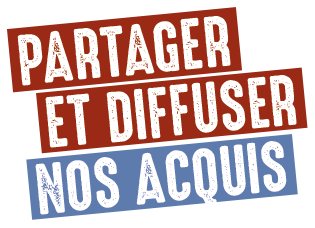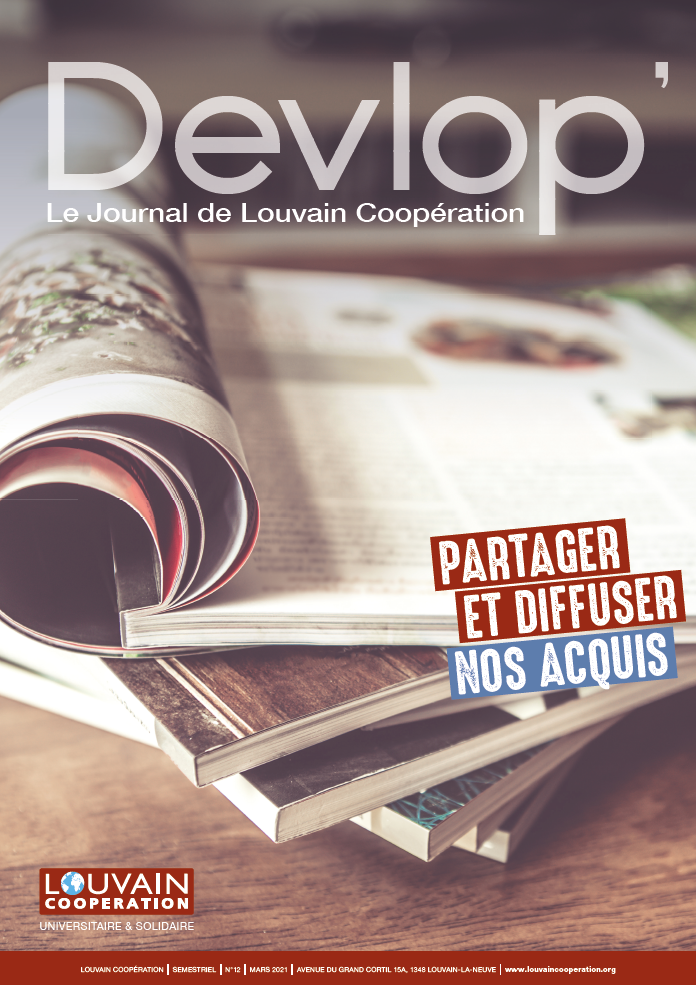

Edito
KNOWLEDGE MANAGEMENT: between promotion, reflection, dialogue and dissemination
Every organisation, through its activities, produces knowledge that constitutes intellectual capital (Préfontaine L et al., 2009, Les sept jalons d'une gestion du savoir efficace [The seven milestones of effective knowledge management]). At Louvain Coopération, we draw this knowledge from the implementation of our interventions with stakeholders and target populations, in close collaboration with local organisations and academics. Managing this knowledge involves identifying, deciphering, organising, highlighting, comparing and communicating it. The knowledge produced, the experience gained and the associated learning are not always valued as highly as they should be, especially when the knowledge comes from marginalised or less socially recognised people (Godrie B et al., 2019, La co-construction des savoirs au prisme de l’épistémologie et des inégalités sociales). Systematising this knowledge not only allows us to value it and take a step back to reflect, but also provides a basis for improving future actions. Knowledge can also sometimes take the form of particular perspectives on the world, developed from specific points of view (Harding S, 1987, Feminism and Methodology). They allow us to take a different look and consider new understandings of the issues that concern us. With these perspectives in mind, we then seek to promote dialogue between different types of knowledge (academic, community, peasant, citizen) in order to fuel reflection. Sharing this knowledge is the natural outcome of a process that aims to benefit as many people as possible. As a university-based NGO, knowledge management is at the heart of our work and is one of our unique features. We invite you to discover this exciting dynamic in the special feature of this issue of Devlop'.
It's not always easy to make the most of your civic experience, such as volunteering or Erasmus, particularly when you're looking for a job. Yet they can be a real asset. Global STEPS is a new tool for measuring and demonstrating the added value of this type of experience. It's a great idea that Louvain Coopération is taking part in, and one that should be disseminated widely!
I taught for 3 months in Benin’. ‘I do voluntary work every weekend for a food bank’. ‘I learnt English during an Erasmus course in Dublin’. There are so many of us who have had wonderful human and civic experiences. Experiences that have forged us and given us many assets to bring to bear in a future job. The problem is that it's complicated to ‘sell’ these experiences to a potential future employer, because their contribution is so subjective and unquantifiable. But what if that were to change? What if, just as we can put a C1 level in English on our CVs, we were able to quantify our cross-disciplinary and civic skills? The Global STEPS tool offers just that!
Funded by ERASMUS +, the European student and teacher exchange programme, this project is the result of a partnership between organisations from five different countries, including Louvain Coopération. Specifically,’ explains Fiona Nziza, Northern Projects Manager for Louvain Coopération, ’it's an online tool that allows you to self-assess 7 cross-cutting citizenship skills. At the end of the test, you get detailed results expressed in professional language, as well as a certificate. But that's not all: Global STEPS also provides practical advice on how to improve your skills, as well as the opportunity to self-assess your progress by taking the test a second time."
While the tool is now well developed, the next challenge is to make it sufficiently widespread so that it is recognised in the professional world. ‘The more people who use it, the more Global STEPS, and therefore our civic experience, will become a must for employers!
In an interview with Devlop' a year ago, our Rector, Vincent Blondel, expressed his desire “for Louvain Coopération and UCLouvain to strengthen each other as much as possible”. This strengthening is achieved through the many collaborations that are taking shape between our sister organisations, and we thought it would be interesting to report on them.
RESEARCH: A number of researchers, doctoral students, dissertation students and other students from UCLouvain work with Louvain Coopération because they are studying issues or questions directly related to our projects or work themes. We give them easier access to the field, to contacts, information and people to talk to, and our teams or partners often take part in the study... while they offer us an analysis of our actions, an opportunity to take a step back and innovate in our projects, in order to increase their impact. It should also be noted that several professors from UCLouvain lend a hand to our NGO on a specific issue or to analyse the quality of a project, and even make a long-term commitment by joining our Board of Directors.
STUDENTS: Nowadays, most students want to complement and compare their academic achievements with meaningful human experiences. Louvain Coopération enables some of them to do just that, whether through the Ingénieux-Sud course-programme, medical internships in the countries where we work, the Étudiant Solidaire programme or the competition organised with the Louvain School of Journalism.
GLOBAL CITIZENSHIP AND SOLIDARITY: Louvain Coopération organises a number of activities with a common objective: to ensure that the wider university community becomes aware of the global system and its various relationships of domination and, above all, commits itself individually and collectively to an inclusive, sustainable, fair and caring society.
On the African continent, maternal mortality after caesarean section remains very high: almost one woman in 200 dies as a result of this operation. That's 50 times more than in Western countries! To combat this problem, Louvain Coopération has produced the manual ‘Pratique de la césarienne en conditions de ressources limitées’ (‘Caesarean section practice in conditions of limited resources’). It's a very practical book, the result of collaboration between academics and experts in the field. Our aim is to distribute it as widely as possible.
A caesarean section is by far the most common procedure in developing countries. It is therefore widely accepted, but unfortunately this does not mean that it is carried out correctly. Even today, it is estimated that one in every 200 African mothers-to-be dies after giving birth by caesarean section.
This figure can be explained by a number of factors, including ‘a lack of knowledge about the indications for carrying out a caesarean section and the technique, as well as a certain acceptance by carers of the caesarean section death rate as inevitable’, explains Dr Christian de Clippele, surgeon and former health expert at Louvain Coopération. As part of his role, he created and published a handbook for healthcare practitioners, setting out a rigorous approach to this operation in conditions of limited resources. The aim: ‘to reduce complications and maternal and infant mortality.
The university dimension of our NGO considerably influences the way we work, the way we design our projects and, more generally, the missions we carry out. Among these, the dissemination of knowledge occupies a very special place. In concrete terms, this means sharing as widely as possible the knowledge that we generate through our projects and the interactions that we encourage between players in the academic world and those in the field, so that it benefits as many people as possible. It's a vital mission, and we want to raise its profile and increase its impact.
What significance can a development project have if it is limited to supporting the people who benefit directly from it, over a given period of time? For these people, of course, this changes everything. But is it enough? At Louvain Coopération, we believe that one of the ways of multiplying the impact of our actions is to disseminate the knowledge that emerges from them.
Lessons learned, ideas, good and bad, successes and failures... as part of our projects, we compile and publish all this information as well as the results of university research linked to our actions. These publications have two aims: firstly, to provide food for thought for our teams and partners so that they can influence our actions and, secondly, to document our learning so that it can be used by other organisations, entrepreneurs, governments and researchers who want to work in the same direction as us and draw inspiration from it.
Like our work themes, these paper and video documents are many and varied. The most recent include ‘The research on migration and its impact on Cambodian children and families’, a study carried out with the IOM (International Organisation for Migration), the University of Hong Kong and PLAN International, and ‘Assessing the impact of approaches and capitalising on learning from the project to support the valorisation of agricultural products and the promotion of crafts in the provinces of Makamba and Rutana (Burundi)’. These documents, as well as all those produced in recent years, are published on our website: www.louvaincooperation.org/fr/capitalisation.

